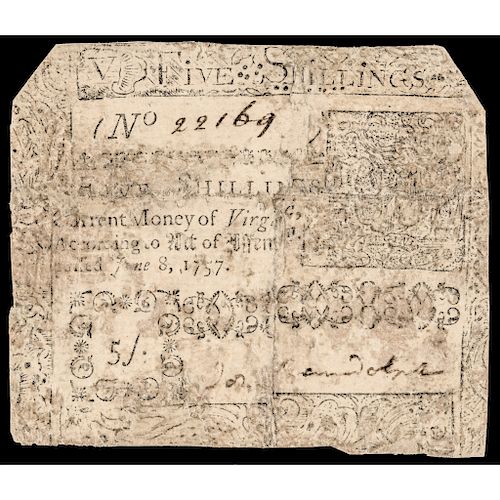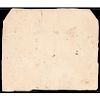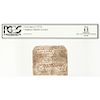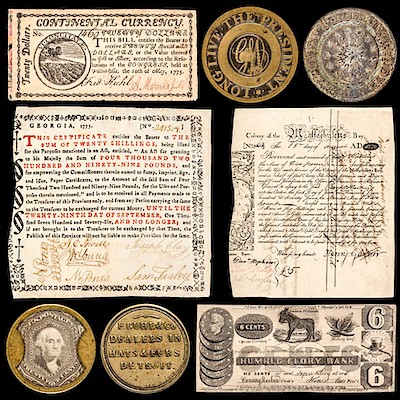Colonial Currency Virginia June 8, 1757 Signed PEYTON RANDOLPH 5 Shillings Note
Lot 128
Estimate:
$1,200 - $1,800
Absentee vs Live bid
Two ways to bid:
- Leave a max absentee bid and the platform will bid on your behalf up to your maximum bid during the live auction.
- Bid live during the auction and your bids will be submitted real-time to the auctioneer.
Bid Increments
| Price | Bid Increment |
|---|---|
| $0 | $10 |
| $200 | $20 |
| $300 | $25 |
| $500 | $50 |
| $1,000 | $100 |
| $2,000 | $200 |
| $3,000 | $250 |
| $5,000 | $500 |
| $10,000 | $1,000 |
| $20,000 | $2,000 |
| $30,000 | $2,500 |
| $50,000 | $5,000 |
| $100,000 | $10,000 |
| $200,000 | $20,000 |
| $300,000 | $25,000 |
| $500,000 | $50,000 |
About Auction
By Early American History Auctions
Jul 13, 2019
Set Reminder
2019-07-13 12:00:00
2019-07-13 12:00:00
America/New_York
Bidsquare
Bidsquare : Colonial & Continental Currency-Coinage-Historic Peace Medals- Encased Postage Stamps
https://www.bidsquare.com/auctions/early-american-history-auctions/colonial-continental-currency-coinage-historic-peace-medals--encased-postage-stamps-4256
Historic Coins, Colonial & Continental Currency, Political, Americana, Encased Postage Stamps, Peace Medals Early American History Auctions auctions@earlyamerican.com
Historic Coins, Colonial & Continental Currency, Political, Americana, Encased Postage Stamps, Peace Medals Early American History Auctions auctions@earlyamerican.com
- Lot Description
Virginia Currency
Rare Peyton Randolph Signed June 8, 1757 Virginia Assembly Note, 1st & 3rd Continental Congress President
PEYTON RANDOLPH (1721-1775). First & Third President of the Continental Congress first elected on September 5, 1774, he presided from September 5, 1774 to October 21, 1774, and again from May 10, 1775 to May 23, 1775, succeeded in office by Henry Middleton, Speaker of the Virginia House of Burgesses, Chairman of the Virginia Conventions, and Governor of Virginia.
Peyton Randolph studied law at the Inner Temple, London; Appointed King's Attorney for Virginia, 1748; Member, Virginia House of Burgesses, 1764-1774 and Speaker in 1766; President of the Virginia Conventions in 1774 and 1775; Delegate from Virginia to the Continental Congress in 1774 and again in 1775; President of the Continental Congress at the time of his death in 1775.
Virginia, June 8, 1757 Act. Five Shillings, Genuine, Signed by Peyton Randolph (1721-1775), First President of the Continental Congress, elected on September 5, 1774 and serving till May 10, 1775, PCGS graded Fine-12. Fr. VA-8. One of the earliest Virginia Colonial Currency issues, this very low 5s denomination would have seen heavy circulation. It is one of perhaps a handful existent, and is the first Five Shillings denomination we have offered, certainly needed in most all collections. This Rare "Genuine" note was fully issued having a uniface design. It is well centered, printed in black upon a thin laid period paper. Noted on its holder for having apparent splits, tears and minor damage, backed. The blank reverse is Contemporarily backed and is free of any notations or other detractions. Serial number 22169 is boldly written. The 5 Shillings denomination was only required to have one signature, in this instance it is Signed by Peyton Randolph. The first name "Peyton" is heavily worn and obscured and the "R" of his last name is written on a heavy centerfold and is not visible, however "andolph" is clearly readable, being written in rich brown ink. Genuine, authentic notes on this early Virginia Colonial paper money issue are considered extremely rare. None on this issue are listed with any valuations in either the Friedberg Paper Money or Newman Colonial Currency references due to their rarity.
PEYTON RANDOLPH (c. 1721 - October 22, 1775). First & Third President of the Continental Congress. He presided from September 5, 1774 to October 21, 1774, and again from May 10, 1775 to May 23, 1775. He was succeeded in office by Henry Middleton.
Randolph was born in Virginia. His parents were Sir John Randolph and Susannah Beverley. He was also the grandson of William Randolph. He attended the College of William and Mary, and later studied law at Middle Temple at the Inns of Court in London, becoming a member of the bar in 1743. He then returned to Williamsburg and was appointed Attorney General of the Virginia colony the next year.
He served several terms in the Virginia House of Burgesses, beginning in 1748. It was his dual roles as attorney general and as burgess that would lead to an extraordinary conflict of interest in 1751.
The new governor, Robert Dinwiddie, had imposed a fee for the certification of land patents, which the House of Burgesses strongly objected to. The House selected Peyton Randolph to represent their cause to Crown authorities in London. In his role as attorney general, though, he was responsible for defending actions taken by the governor. Randolph left for London, over the objections of Governor Dinwiddie, and was replaced for a short time as attorney general. He was reinstated on his return at the behest of officials in London, who also recommended the Governor drop the new fee.
In 1765 Randolph found himself at odds with a freshman burgess, Patrick Henry, over the matter of a response to the Stamp Act. The House appointed Randolph to draft objections to the act, but his more conservative plan was trumped when Henry obtained passage of five of his seven Virginia Stamp Act Resolutions. This was accomplished at a meeting of the House in which most of the members were absent, and over which Randolph was presiding in the absence of the Speaker.
Randolph resigned as attorney general in 1766. As friction between Britain and the colonies progressed, he became more in favor of independence. In 1769 the House of Burgesses was dissolved by the Governor in response to its actions against the Townshend Act. Randolph had been Speaker at the time. Afterwards, he chaired meetings of a group of former House members at a Williamsburg tavern, which worked toward responses to the unwelcome tax measures imposed by the British government.
Randolph was selected to chair in both the First and Second Continental Congresses, in large part due to his reputation for leadership while in the House of Burgesses. He did not, however, live to see independence for the nation he led; Randolph died in Philadelphia, and was buried at Christ Church. He was later re-interred at the College of William and Mary chapel.
Randolph County, North Carolina, formed in 1779, and two US Navy ships called USS Randolph were named in his honor.
Randolph's house survives and is a U.S. National Historic Landmark. Known as Peyton Randolph House, it is shown to the public as part of the Colonial Williamsburg complex.
- Shipping Info
-
Early American provides in-house worldwide shipping. Please contact us directly if you have questions about your specific shipping requirements.
-
- Buyer's Premium



 EUR
EUR CAD
CAD AUD
AUD GBP
GBP MXN
MXN HKD
HKD CNY
CNY MYR
MYR SEK
SEK SGD
SGD CHF
CHF THB
THB
















